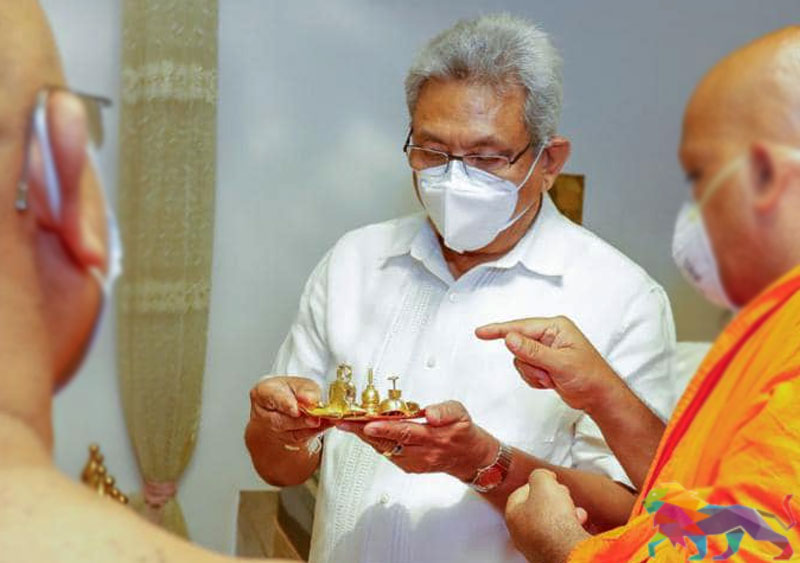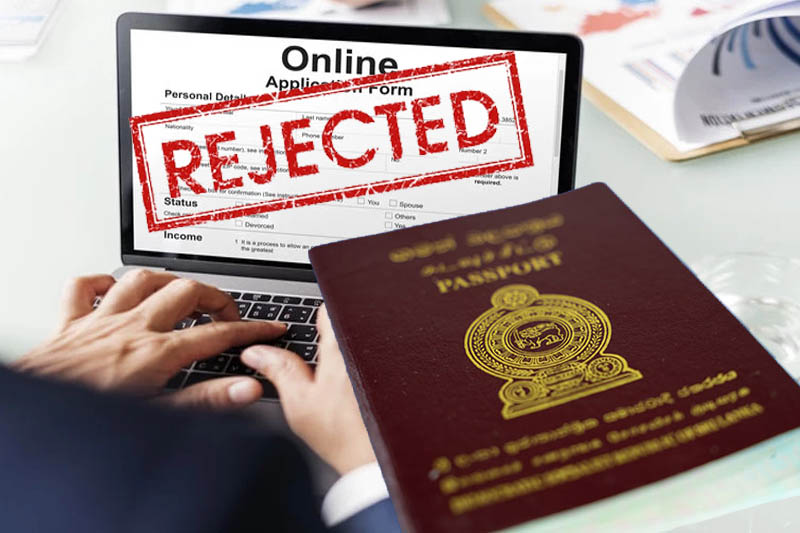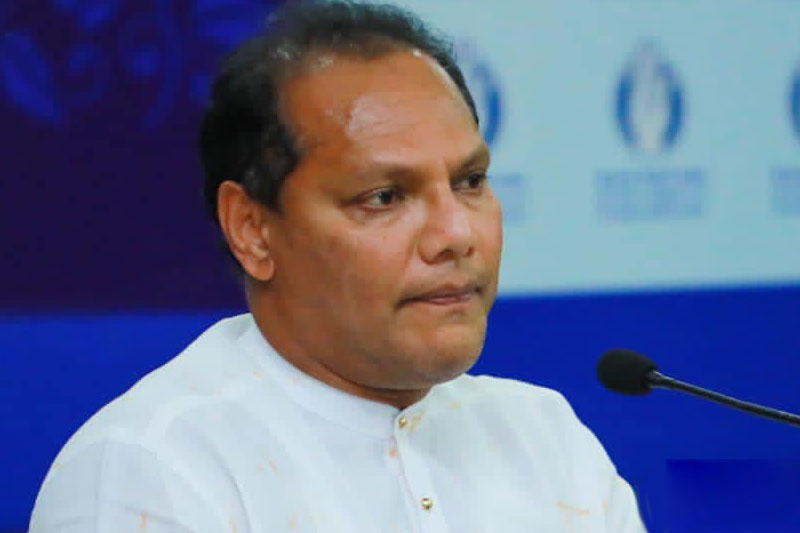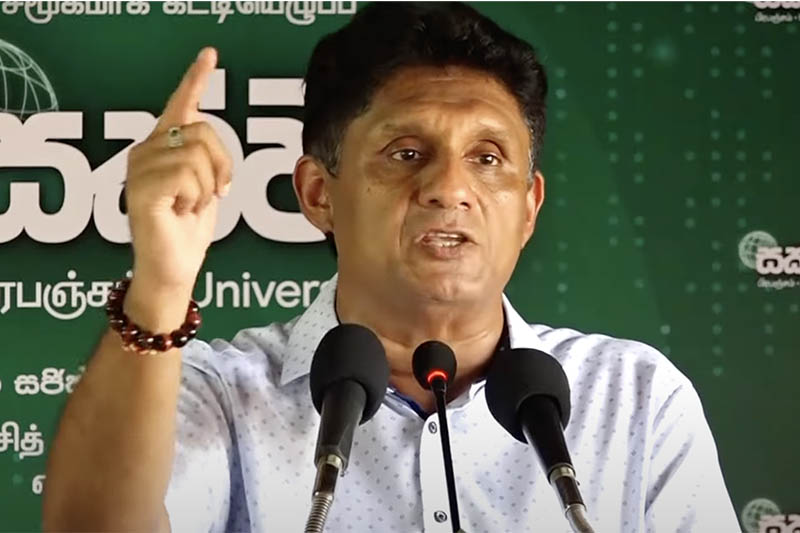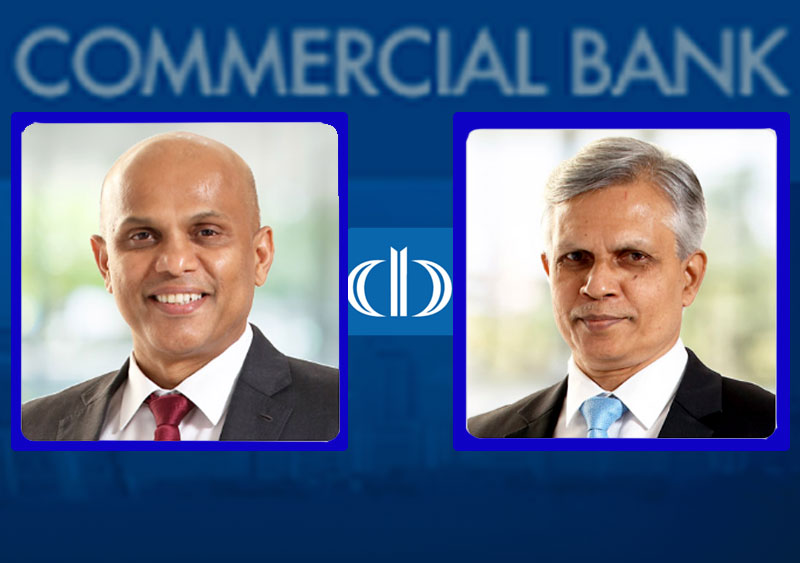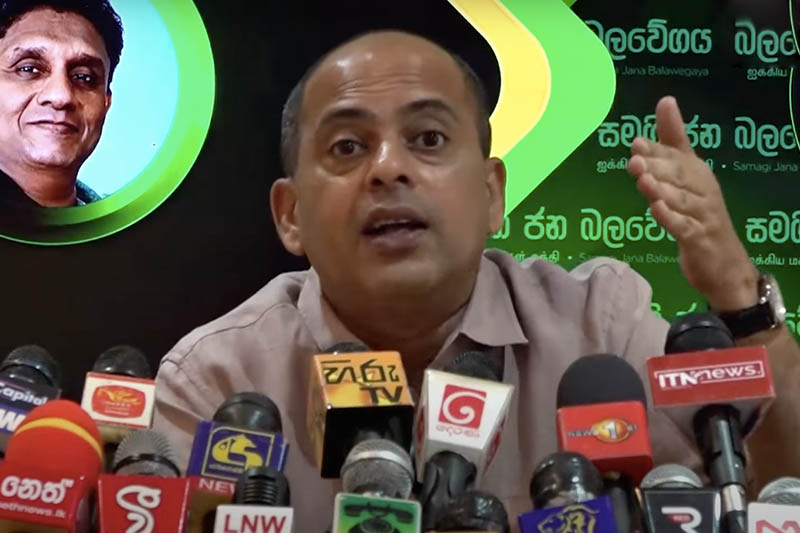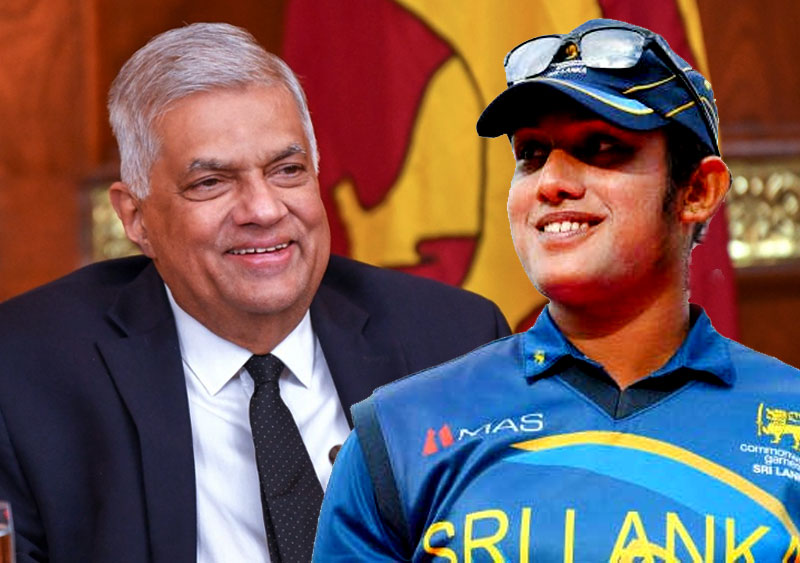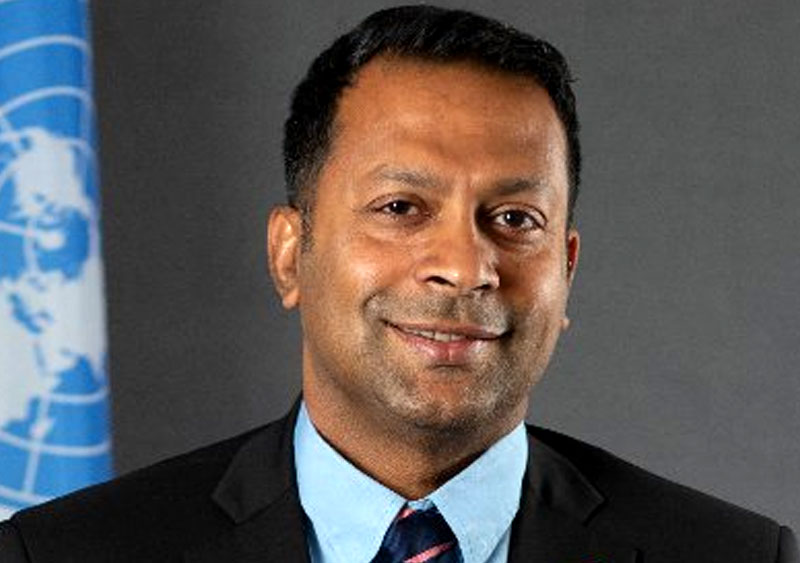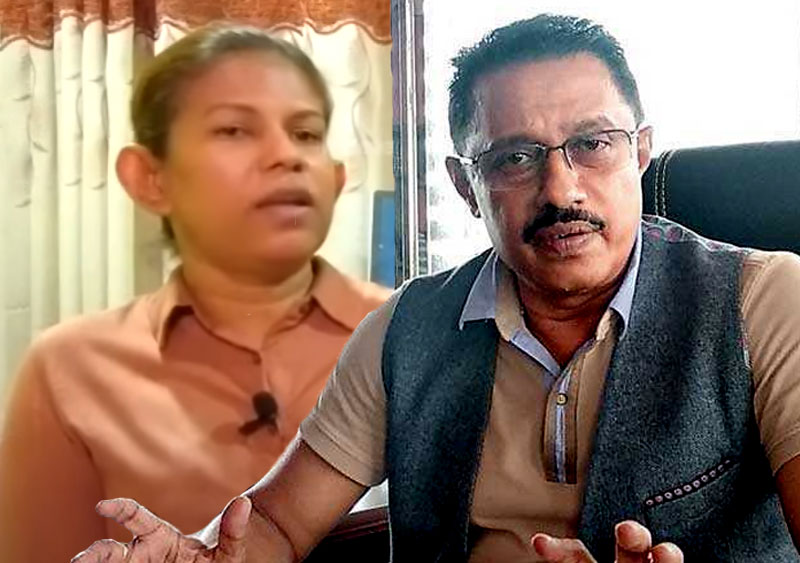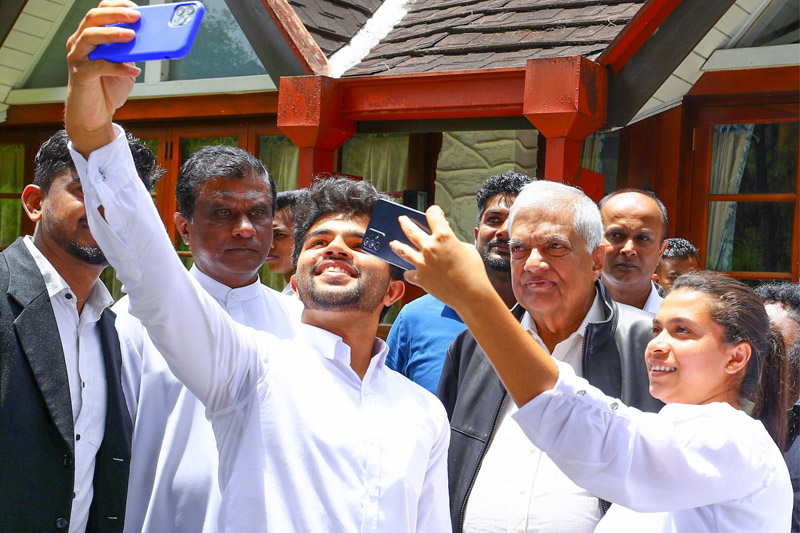Convening a press conference in Colombo today (26), Jayasuriya, the Chairman of the National Movement for a Just Society, divulged further details pertaining to this claim.
"It is a fact that public opinion was against the 20th Amendment. At the same time, there was strong opposition from all religious leaders, including the Maha Sangha, as well as from civil society and intellectuals throughout the country.
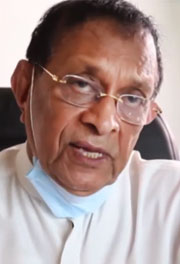
"The next morning, a group of police officers had visited the Ramanna Chapter and met with the members of the Ramanna Samagri Sangha Sabha, including the Ven. Anunayakae thero and questioned regarding those statements. We decided that it would be better to refrain from divulging this incident at that time since it had the capacity to cause public resentment and to take this up at an appropriate time later on. Today, we feel it is appropriate to reveal this fact," he said.
The former Speaker observed that the most respected theros in the country should not be questioned for expressing dissenting views pertaining to the 20th Amendment
"Such incidents can happen in a country with a dictatorship or in a society with an autocratic leadership, but as a democratic country, we should be ashamed of such things happening in Sri Lanka," he said.
Pointing out that attempts to suppress the freedom of expression have been the subject of heavy criticism in the country lately, he said that the right to freedom of thought is a fundamental human right recognized by the United Nations. "The right to freedom of expression is also enshrined in Article 14 of the Constitution of Sri Lanka," he said.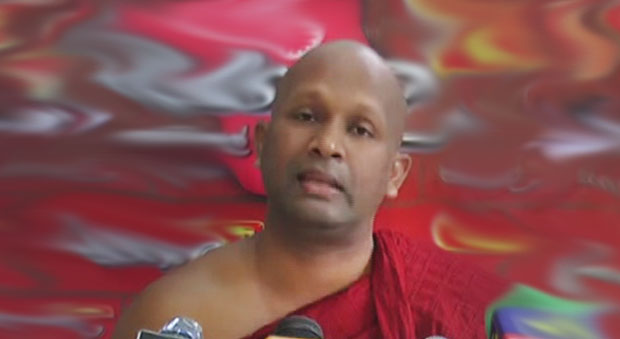 The convenor of the Sinhala National Force, Ven. Madille Pannaloka thero, has been questioned by the CID for exposing corruption
The convenor of the Sinhala National Force, Ven. Madille Pannaloka thero, has been questioned by the CID for exposing corruption
"The convenor of the Sinhala National Force, Ven. Madille Pannaloka thero, has been questioned by the CID for exposing corruption and irregularities in the country," Jayasuriya said.
Imthiaz Bakeer Marker, a former Media Minister stated in Parliament that a document containing information on 200 journalists has been submitted to the CID. In this backdrop, Media Minister Keheliya Rambukwella recently stated that new laws will be enacted to regulate social media and websites in Sri Lanka within a few weeks.
"We hope that laws hindering the freedom of expression are excluded. We firmly believe that the media should adhere to ethics while respecting the existing laws and regulations in the country. It is very important to reach a consensus between the government and the media fraternity in this regard," he noted.
He also said that journalists have been barred from covering parliamentary sittings from the legislature.
"Parliamentary staff including government officials and persons who provide various services are allowed to enter the Parliament complex. As such, it is irrational and incomprehensible to deprive journalists of the privilege to cover parliamentary proceedings," he said.
He recalled that Sri Lanka is a country that has been marred with a history of injustice towards journalists and it is the responsibility of any government to administer justice for crimes that have been committed against journalists. "We expected that from the previous government as well. However, none of those expectations were fulfiled," he said.
"Today, we live in a country where the perpetrators, who are responsible for many of the most serious and heinous crimes against the media, are still at large," he added.
Speaking further, the former Speaker said;
"Although the current government is led by a new president, it cannot be considered a new government.
The incumbent Prime Minister is an experienced and senior politician who has twice held the executive presidency of this country. His Excellency the President was also a senior official in charge of security in both of those governments. Therefore, they have good experience and understanding with regard to governance. Accordingly, they are mature and well-informed to comprehend the facts we present today.
Generally, the first year of any government elected to office is considered to be a peaceful and pleasant period in which there is no conflict between the media and the government. It is usually devoid of harsh criticism from the general public.
But that has not been the case in our country over the past year. We deeply regret this. At the same time, it seems that the dark shadows that we experienced in the past are resurfacing. That is what we regret the most.
We would like to point out a number of unfortunate incidents that our journalists have faced in recent times.
CID officers had searched the Colombo residence of former Editor of the State-owned Sunday Observer and the Colombo correspondent of the New York Times, Dharisha Bastians, and taken away her computer. Close members of her family were also questioned by the CID. She is an internationally respected journalist.
Krishantha Cooray, the former Chairman of Lake House, was also persecuted in the same manner by making various unsubstantiated allegations. He is a world renowned journalist, CEO and a giant in the media industry.
Two journalists, Kanapathy Pillai Kumanan of the Veerakesari newspaper and Shanmugam Thavaseelan of the Hiru Media Network, were attacked and injured by a group of people while reporting on illegal logging. The assaulters caused damage to their camera equipment as well. We heard that a number of media organisations in this country had informed the IGP on this matter.
Another journalist, Indunil Wijenayake, who went to report on a sand racket in Monaragala was also assaulted.
We also saw how a police investigator threatened Akila Jayawardena, a photojournalist who was on duty at the Colombo High Court premises.
Many such unfortunate incidents have been reported in the recent past.
Meanwhile, the other issue that warrants our special attention is the threat faced by the ordinary citizens of this country who express views through social media.
One example is the tragic fate of Ramzy Razeek, who was arrested and detained for a long time last April. He was released on bail several months later.
The authorities of this country should note and understand the statement made by the Hon. Judge of the Colombo High Court during Razeek's bail application.
The Hon. Judge stated that every person is entitled to freedom of thought in accordance with Chapter 3, Article 10 of Sri Lanka’s Constitution.
He had also pointed out that the right to freedom of expression includes the right to protest in accordance with a number of judgments had been delivered by the Supreme Court of Sri Lanka on various occasions.
Despite this, it is shocking to see the continuous arrests of citizens of this country who express themselves.
We are most concerned about the authorities arresting ordinary citizens, who have only expressed certain views and opinions regarding the COVID pandemic.
Today, this unfortunate situation is receiving international attention. The UK government also issued a statement last week noting the deterioration of the human rights environment in Sri Lanka with the continuation of surveillance and intimidation of activists and human rights defenders.
We recognize that the fight against the COVID-19 pandemic is one that entails a national responsibility.
It is also clear that steps should be taken to prevent the spread of misinformation that could lead to civil unrest.
The best course of action is for the government to set up a proper mechanism to disseminate accurate information. If any misinformation is published, it is our responsibility to correct it.
We can take many examples from Great Britain.
Between 2012-2014, our movement led by the Most Ven. Sobhitha thero had to protest on the streets calling for the protection of media rights as well as journalists.
But we can see a stark difference on the use of media today in comparison to that period. New technology has enabled the progression of the media industry by a long way. Social media too has progressed tremendously. Today, it is not possible to deceive people all the time and the truth will be revealed sooner than later.
Therefore, the government must always choose the right path. If anyone wants to rule this country by suppressing media freedom and by disrupting or blocking social media, it will surely have to suffer the consequences.
If we want to engage with the world properly, if we want to attract investment to this country, if we want to retain the GSP concessions, if we want to maintain a good reputation internationally as a democratic country, then choose the right path.
The future prosperity of the country does not lie in the unlimited powers of the 20th Amendment but through the correct decisions taken by His Excellency the President.
I would like to make one more request from the President.
That is to seek the blessings of the Buddhist Advisory Council you have set up in order to seek advice and views of the Maha Sangha in the process of implementing policies of the government.
It will also help to preserve the dignity of your government as well as those who represent the Maha Sangha," he added.

